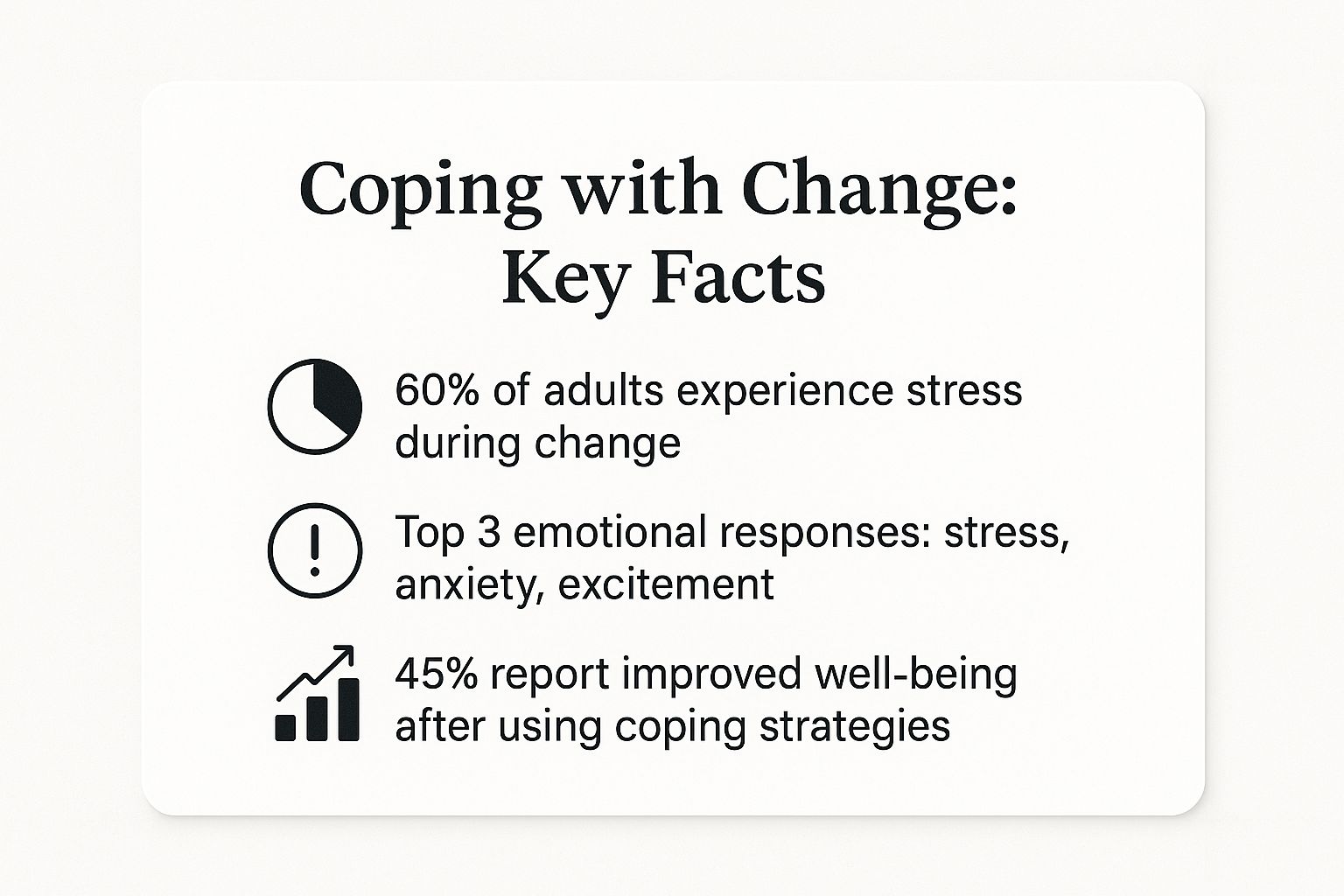How to Cope with Change in an Uncertain World
- Therapy-with-Ben
- Sep 11, 2025
- 14 min read
Let's be honest, change can feel deeply unsettling. Whether it's a career move you’ve planned for months or something that comes completely out of the blue, life’s transitions often bring a wave of uncertainty that can leave you feeling adrift.
It’s a completely normal human reaction to feel anxious, sad, or even frustrated when the familiar ground beneath your feet starts to shift. The very first step in learning how to cope with change is simply to give yourself permission to feel those things, without judgement.
This isn't about slapping on a brave face or forcing yourself to "be positive." It's more about reframing the experience. While you can't control every external event that life throws at you, you absolutely can strengthen your ability to navigate it. The key idea here is to shift your focus from the uncontrollable storm outside to the anchor you can build within yourself.
Shifting Your Perspective on Life's Transitions
So, how do you build this inner anchor? It comes down to focusing on four foundational pillars. These aren't complex psychological theories but practical, down-to-earth principles that provide stability when you need it most.
The Four Pillars of Coping
Think of these as your go-to strategies for staying grounded when things feel chaotic.
Acknowledge Your Feelings: Let yourself feel whatever comes up – anger, fear, confusion – without labelling it as 'good' or 'bad'. Trying to suppress emotions only makes them louder in the long run.
Anchor Yourself with Routines: When everything feels up in the air, predictability is your friend. Sticking to simple daily habits, like your morning coffee or an evening walk, provides a comforting sense of normality.
Lean on Your Support System: You don't have to weather the storm alone. Reaching out to friends, family, or a therapist is a powerful way to combat the isolation that change can bring.
Show Yourself Compassion: Be kind to yourself. You’re going through a lot. Treat yourself with the same care and understanding you would offer a good friend in the same situation. Self-criticism is never a helpful coping strategy.
The infographic below offers a glimpse into how people emotionally respond to change and highlights the real impact that using coping strategies can have.

What this data shows is that while stress is a very common reaction, actively using these kinds of coping strategies leads to a significant improvement in well-being for nearly half of individuals. It's a powerful reminder that the actions you take really do matter.
To give you a clearer picture, here’s a quick summary of how these pillars work together to build your resilience.
Four Pillars for Navigating Change
Pillar | What It Involves | Why It's Effective |
|---|---|---|
Acknowledge Feelings | Naming and accepting emotions without judging them. | Prevents emotional build-up and promotes self-awareness. |
Anchor with Routines | Maintaining simple, consistent daily habits. | Creates a sense of stability and control amid uncertainty. |
Lean on Support | Connecting with trusted friends, family, or professionals. | Reduces feelings of isolation and provides outside perspective. |
Practise Self-Compassion | Treating yourself with kindness and understanding. | Counteracts negative self-talk and fosters resilience. |
By focusing on these four pillars, you're not trying to stop the waves of change from coming. You're learning how to surf them.
It's about realising that you already possess the inner resources to handle life's transitions, one day at a time.
This approach helps transform change from an overwhelming obstacle into a manageable part of your life's journey.
Why Is Change So Damn Hard?

Have you ever wondered why even a really positive change, like landing your dream job or finally moving house, can feel unbelievably stressful? You’re not alone. It’s a completely normal experience, and the reasons are wired deep into our psychology. Our brains crave predictability; they like knowing what's coming next because that feels safe. When things shift, it can set off a whole cascade of powerful, often messy, emotions.
At its most basic, change is the unknown. This uncertainty can trip our primal ‘fight,flight,freeze’ response, a survival instinct that's there to protect us from genuine threats. Suddenly your heart is pounding, your thoughts are racing, or you just want to run and hide. These are all perfectly natural reactions when your brain senses a disruption to its carefully constructed, stable world.
This isn't just for life-or-death moments. It happens during a company reshuffle, the end of a relationship, or even when you bring a new baby home. The trigger is always the same: the familiar has been swapped for the unpredictable, and your nervous system is sounding the alarm.
The Grief for What Was
It's also really important to realise that every change, whether you see it as good or bad, comes with a loss. When you move to that amazing new city, you leave behind local cafes, familiar faces, and daily routines. Even getting a promotion means letting go of the comfort and shared jokes of your old team.
This sense of loss can trigger a real grief process. You might feel sad, angry, or in denial—not because the new thing is bad, but because a chapter of your life has closed. Simply acknowledging this grief is a huge step in learning how to cope with change.
Letting yourself mourn what you’ve lost doesn't mean you're not grateful for what's ahead. It means you're honouring your full emotional experience, which is essential for moving forward in a healthy way.
This resistance to letting go is a big part of why adapting feels so difficult. We see this all the time in the workplace. Research shows that over 70% of change initiatives in the UK fail, mostly due to employee resistance right at the start. This isn’t just a statistic; it has a human cost, with 32% of employees reporting that change-related stress made them less productive. You can find more insights on these dynamics over at Passivesecrets.com.
Navigating the Anxiety of the Unknown
Finally, change forces us to stare into an uncertain future, which is a natural breeding ground for anxiety. Questions like, "What if I can't do this?" or "Did I make a massive mistake?" can take over. This anxiety can feel overwhelming and sometimes spiral into low mood or even depressive feelings. If you find yourself struggling to manage it all, it's always worth looking into the best therapy for depression to find the right kind of support.
So, what can you do when you’re right in the middle of it? The first step is to just notice these feelings without judging yourself for having them.
Try some targeted journaling: Ask yourself, "What specifically about this change is making me anxious?" or "What do I actually miss about how things were before?" Getting it down on paper can help untangle the knot of thoughts.
Use simple mindfulness: When you feel that wave of overwhelm, just pause and focus on your breath. Breathe in for four counts, hold for four, and breathe out for six. This simple exercise can calm your nervous system right down and pull you back into the present moment.
Understanding why change feels so hard is the first step toward getting through it. These feelings aren't a sign of weakness; they’re a sign that you're human.
Your Practical Toolkit for Managing Change

Okay, so understanding why change knocks us off our feet is a huge first step. But the big question that always follows is, "Right, so what do I actually do about it?" This is where we pivot from theory to action. Getting good at coping with change is all about building a personal toolkit of strategies you can reach for when things feel shaky.
These aren't complex psychological theories you need a degree to understand. They're real, tangible techniques designed to ground you in the here-and-now and give you the power to move forward, one small step at a time. It’s all about actively navigating the choppy waters, not just letting the waves crash over you.
Identify Your Stability Anchors
When life feels like a storm, the first thing you need is an anchor. Your stability anchors are those consistent, reliable parts of your life that you can cling to when everything else is swirling in uncertainty. They’re the constants that bring back a sense of normality and control.
Just take a moment and think about what in your life stays the same, no matter what’s going on around you.
Your daily rituals: That first cup of tea in the morning, a quick 15-minute walk on your lunch break, or reading a few pages of a book before you sleep. These small routines are incredibly powerful.
Your core relationships: Leaning on a partner you trust, a friend you’ve known for years, or a supportive family member can be an immense source of comfort.
Your personal values: What you believe in – things like kindness, integrity, or curiosity – doesn't change. These are your internal compass.
Your physical space: It could be your favourite armchair, the comfort of your own bed, or even a quiet bench in a local park. These places can feel like a safe harbour.
Try to identify three to five of your own stability anchors right now. Actually write them down. When you feel that sense of overwhelm creeping in, consciously turning your focus to one of these can help calm your nervous system and remind you that not everything is in flux.
Challenge Your Negative Thoughts with Cognitive Reframing
During periods of change, our minds can easily become a playground for negative thoughts. "I'll never cope with this," or "Everything's going to fall apart" are tunes many of us know well. Cognitive reframing is a brilliant technique for pushing back against these automatic negative thoughts and developing a more flexible mindset.
This isn't about slapping on a fake smile or "just being positive." It's about finding a more balanced and realistic perspective.
The real goal here is to question the story you’re telling yourself about the change. Our first draft of that story is often written in the ink of fear and anxiety, and reframing helps us see other possible endings.
Let’s say you’ve been made redundant. Your automatic thought might be, "This is a total disaster; I've failed." A reframe could sound more like, "This is incredibly difficult and scary, but it might also be an unexpected chance to find a job that’s a better fit for me in the long run."
When we’re navigating big life transitions, it’s not unusual to feel anxious or low, and knowing how to handle these emotions is vital. There are many effective coping strategies for anxiety and depression that can help build your resilience when you need it most.
Break Down the Change into Manageable Steps
A massive life event, like changing careers or moving to a new city, can feel like staring up at an impossibly steep mountain. That feeling of being totally overwhelmed is often what keeps us stuck. The secret is to stop looking at the mountain and instead break it down into a series of small, manageable hills.
Forget about the enormous end goal for a minute. Just identify the very next, tiny action you can take. For that career change, it might look something like this:
This week: Spend an hour updating just one section of your CV.
Next week: Connect with one new person on LinkedIn who works in the field you’re interested in.
The week after: Spend 30 minutes just researching a single company you admire.
Every tiny step you complete builds a little bit of momentum and, crucially, a sense of control. This simple approach shifts your focus from a frightening, unknown future to a present you can actually influence. The anxiety that so often comes with change can make even these small steps feel hard, but there are proven ways therapy can help you manage anxiety and get back in the driver's seat.
Using Connection to Build Resilience

Trying to get your bearings during a big life change can feel incredibly isolating. It’s easy to feel like you’re the only one on shaky ground, and the natural instinct for many of us is to pull back when we feel vulnerable.
But this is precisely the moment when reaching out becomes one of the most powerful things you can do for your own resilience. I want to be clear on this: you really don't have to go through it all alone.
When we keep things to ourselves, our worries have a funny way of getting louder and larger. Without an outside perspective, a small concern can easily spiral into a catastrophe inside our own heads. Sharing what you’re going through provides a much-needed reality check. It validates your feelings and serves as a simple reminder that you’re not the only one.
How to Actually Talk About What You Need
Of course, knowing you need support and finding the words to ask for it are two very different things. It can feel awkward, or like you’re being a burden. The good news is, it doesn't have to be some grand, complicated conversation. The key is to be clear and direct, even if you’re not quite sure where to begin.
Sometimes, just letting someone know you're having a hard time is enough to open the door. You could try starting a conversation with a trusted friend or family member with something simple like:
"I'm finding things a bit tough with [the change] at the moment. Would you be free for a chat sometime this week?"
"I'm not really looking for solutions, but I could really use someone to just listen for a bit. Is now a good time?"
"Things feel a bit overwhelming right now, and I think talking it through might help me make sense of it all."
These kinds of phrases state your need gently and invite connection without putting anyone on the spot.
The simple act of being heard and understood by someone you trust can be profoundly therapeutic. It lightens the emotional load and reinforces the strength you have in your corner.
Feeling Heard Is Just as Important at Work
This need for connection is absolutely critical in our professional lives, too. Change at work can often feel impersonal and dictated from on high, leaving people feeling disconnected and like their voice doesn't matter. This is a huge factor in how well people in the UK cope with organisational shifts.
A recent poll really highlighted this gap: less than half (47%) of UK executives even consider the impact on their employees when planning big changes. Worse, only 44% actively ask for opinions during the process. Is it any wonder, then, that 23% of employees feel that changes were managed badly? You can read more about how employee involvement shapes these transitions over on Workplace Insight.
Being able to voice your concerns to a manager or a trusted colleague makes a world of difference. It shifts you from being a passive recipient of change into an active participant. That feeling of agency is essential for maintaining your well-being and sense of control. Building and leaning on that support system is a vital part of learning how to cope with whatever change comes your way.
By Therapy-with-Ben
Finding Growth and Opportunity in Transition
Navigating change can often feel like you’re just trying to keep your head above water. It’s so easy to get caught up in surviving the immediate disruption that we forget to look up and see what might be on the horizon.
This isn’t about slapping a coat of toxic positivity over a genuinely difficult time. Far from it. It's more about gently shifting your focus towards the future and recognising the potential for growth that almost always comes with major life transitions.
When you weather a storm, you don't just return to where you were before. You come back with a deeper resilience and self-awareness that becomes a permanent part of who you are. The very act of getting through a tough patch equips you with new skills, even if you don't realise you're learning them at the time.
In many ways, this process forces you to get crystal clear on your personal values. When everything familiar is stripped away, what you're left with is what truly matters.
Looking Forward with Purpose
Finding a new sense of direction doesn't happen overnight. It starts with setting small, forward-looking goals that pull you forward, one day at a time. The aim isn't to create a ten-year plan, but simply to create little pockets of purpose that stop you from feeling adrift.
Here’s a simple exercise to get you started:
Identify One New Skill: What’s one small thing you could learn that feels interesting right now? It could be as minor as a five-minute language lesson on an app or trying out a new recipe for dinner.
Acknowledge Your Resilience: Take a moment to write down three specific ways you’ve managed a challenge this week, no matter how small it seems. This is about reinforcing your own capability.
Set a Tiny Goal: What is the smallest possible action you can take tomorrow that aligns with your values? If you value connection, maybe your goal is just to send a text to a friend you haven't spoken to in a while.
The point of these small goals is to restore your sense of agency. They’re gentle reminders that even when the world feels chaotic, you still have the power to steer your own ship.
I’ve seen this happen time and again in my practice. I worked with one client who, after a sudden redundancy, felt completely lost. He started by focusing on the tiny goal of going for a walk in a new park each day. It seemed simple, but this not only boosted his mental health but also helped him rediscover a long-forgotten passion for photography. That small step eventually led him to pursue freelance work he found far more fulfilling than his old job.
Building Resilience in the Workplace
Coping with change at work is a huge issue in the UK right now, as technology and economic shifts continue to reshape entire industries. One report I read suggested that 63% of UK executives believe their workforce is unprepared for change. At the same time, 45% of employees feel they don't have the support they need to adapt.
That's a critical skills gap, especially when you consider that around 40% of UK jobs are expected to see massive changes to their core tasks by 2030. You can read more about these findings on organisational change if you're interested.
Embracing these periods of transition—whether they're personal or professional—is a genuine opportunity to deepen your self-understanding. For some, this journey of discovery is linked to embracing neurodiversity as a personal and counselling journey.
Every challenge you navigate is a testament to your own strength. The resilience you build today becomes a foundational part of who you are, serving you for a lifetime.
By Therapy-with-Ben
Common Questions About Coping with Change
Even when you’ve got a good set of tools to hand, it’s only natural for specific questions and worries to pop up when you’re right in the thick of a major life change. Let's tackle some of the most common concerns I hear from clients in my practice to bring a little extra clarity to your journey.
How Long Should It Take to Adjust to a Major Change?
This is probably the question I get asked most, and the honest answer is: there's no set timeline. Adjusting to change is a deeply personal process, and how long it takes really depends on the change itself, the support you have around you, and your own unique way of processing things.
Rather than fixating on a deadline to feel "back to normal," a more helpful approach is to focus on small, daily steps forward. The goal isn't just to 'get over it' as quickly as possible. It's about slowly integrating these new circumstances into your life in a way that feels healthy and right for you. Be patient with yourself. Be compassionate.
Your journey through change is yours alone. Honour your own pace and try to avoid the trap of comparing your progress to anyone else's.
What if the Change Feels Completely Out of My Control?
Feeling powerless is a completely natural and valid response when change is thrown at you unexpectedly. The first thing to do is simply allow yourself to feel it, without judgement. Fighting against that feeling often just gives it more strength.
Once you’ve acknowledged it, you can gently begin to shift your focus toward what you can control, no matter how small it might seem. I often talk to clients about their 'sphere of control', which might include things like:
Your daily routine (the time you wake up, when you eat your meals).
Your physical movement (even a short walk or five minutes of stretching).
Your responses to your own thoughts (making a conscious choice not to spiral).
Zeroing in on these small areas where you still have agency helps to rebuild a sense of stability from the ground up. It’s a powerful reminder that even when the world outside feels chaotic, you still have influence over your own immediate world, one decision at a time.
Is It Normal to Feel Physically Unwell During a Big Life Change?
Yes, it's absolutely normal. The mind-body connection is incredibly powerful, and our emotional distress often finds a way to show up physically. All the stress and anxiety that comes with navigating a major change can easily manifest as fatigue, headaches, stomach issues, or trouble sleeping.
Think of it as your body's way of signalling that it's processing a heavy emotional load. This is why self-care isn't an indulgence during these times; it's essential. Focusing on nourishing food, gentle exercise, and proper rest will give both your mind and body the support they need to adapt.
Navigating change is a journey, and you don't have to do it alone. If you're looking for professional support to help you build resilience and find your footing, Therapy with Ben offers compassionate, person-centred counselling in Cheltenham and online. Find out more at https://www.therapy-with-ben.co.uk.










Comments